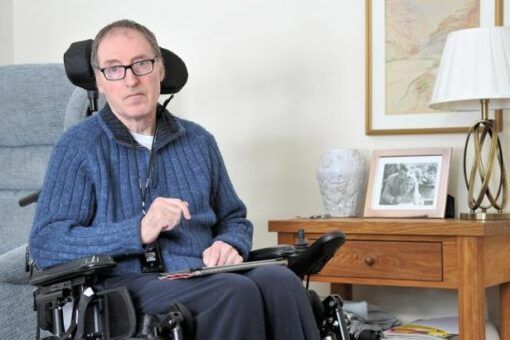The Times Scotland: Assisted dying can complement palliative care

Former head teacher, Richard Selley, first revealed his plans to control his death by going to Dignitas in Switzerland last month.
The public response to his story has convinced him that support for allowing assisted dying for the terminally ill is stronger than ever and he hopes that the story of his death will help to bring about a change in the law. Today (2 August) he has written in The Times about how he sees the option of assisted dying as an important choice which should exist alongside high quality end-of-life care
If I could have chosen a reason for having a few days in the spotlight, it wouldn’t have been my impending death. However, when I switched on the BBC news at the start of last month and saw my plan to die had knocked Nicola Sturgeon’s meeting with Theresa May off the top spot, I had to smile.
The media have their critics but my wife, Elaine, and I have been impressed by the sensitivity shown by journalists and presenters since I stated my intention to end my life at Dignitas in Switzerland. I am in the final stages of motor neurone disease and the paralysis it causes means I can no longer talk, walk or eat.
Had I been able to speak, however, I would certainly have screamed at James Mildred, of the Christian charity Care, who argued that if the right to die was allowed in cases like mine in Scotland it would lead to thousands of elderly people feeling they had a duty to die. Such a blatant attempt to distort the picture is scaremongering of the worst kind. He also argued that what we need is assisted living, not assisted dying. He clearly shares this view with Roseanna Cunningham, my MSP, who claimed in her recent letter to me that our priority should be palliative care, not assisted dying.
Sadly, this shows a failure to understand the relationship between the two. The palliative care I have received at the Cornhill hospice in Perth over the past four years has been outstanding but there is a limit to what they can now do for me. Assisted dying in terminal cases like mine would never replace palliative care; it would complement it by offering a choice for those who feel they have suffered for long enough.
It is interesting that neither Mildred, a spokesman for a Christian group, nor Cunningham, a devout Catholic, mentioned their faith. I cannot accept that assisted dying and a strong faith are mutually exclusive. Richard Holloway, the former bishop of Edinburgh, Baroness Richardson, former president of the Methodist Conference, and Rabbi Jonathan Romain are just some of the religious leaders who see no contradiction.
Unlike Mildred and Cunningham, who offer me nothing but sympathy, they are capable of stepping into my shoes and showing genuine understanding. If there is a God, I simply do not believe he would want people like me to be tortured by being kept alive with no hope of anything but further deterioration and suffering. I would hope that he thinks more of us than that.
Richard Selley